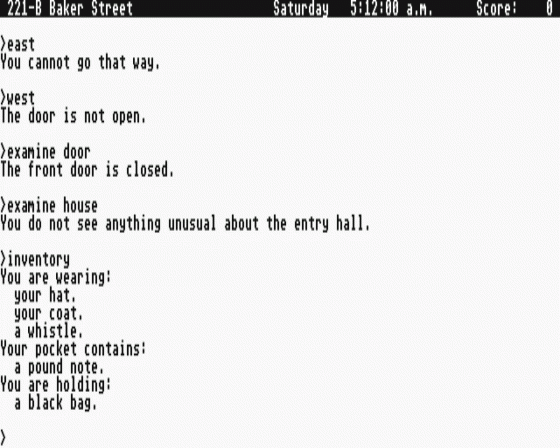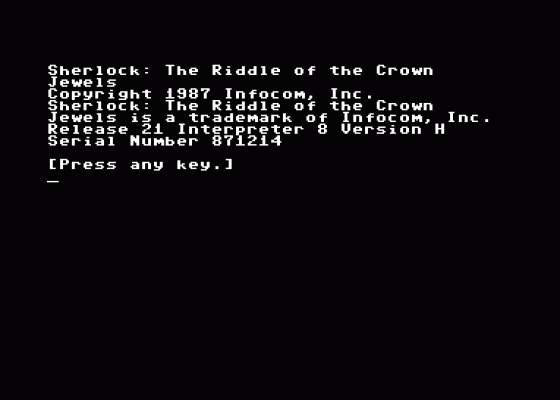
C&VG
 1st May 1988
1st May 1988
Categories: Review: Software
Publisher: Infocom
Machine: Commodore 64/128
Published in Computer & Video Games #79
Sherlock: The Riddle Of The Crown Jewels
The Tower of London has been closed without apparent reason, and the great detective deduces that the Crown Jewels have been stolen before even his important visitor from HM Government informs him. Sherlock's task is to find the jewels before 9 o' clock on Monday, for the Coronation festivities. Today is Friday, June 17th, 1887, according to your copy of the Thames.
The only clue left behind by the thief is a sheet of paper on which has been written a number of verses. Not missing a trick, Holmes is certain that the thief knows the way that he thinks, and has deliberately laid a trail for him to follow. He therefore suggests that you, Watson, should decide what to do, in order to fool the thief.
It is not long past 5am as you step out into Baker Street, the thick London fog swirling around you, and the great detective following. After reading the cryptic verses carefully, a quick look at the map of London supplied with the package, gives you a few ideas, and it seems wherever you are headed you have a fair walk ahead - so perhaps a cab...?

HAIL CAB is an expression that comes to mind, but it is not the correct one. Not only that, King's Cross Road is *not* your destination, and, thankfully, the game does not understand the word CABBY - although the cabby does say "Where to, guv'nor?".
However, it seems cab drivers in the nineteenth century were not very well up on London's geography, for they seem to take you to anywhere but the place you want to go! Mind you, you don't have to pay!
Comparisons with that well-hyped disaster of clever programming, the Melbourne House Sherlock of some years back, are, of course, inevitable. Thankfully, Infocom's Sherlock is not played in real time, although the time and day are displayed on the screen, and time marches on, move by move. The standard Infocom parser and input system are infinitely more user-friendly than that of Sherlock's predecessor, with its tortuous SAY TO LESTRAD "WHY ARE YOU SO DAMN STUPID" form of speech.

But perhaps the most outstanding difference between the two games is the research that has gone into Crown Jewels. Phillip Mitchell's Sherlock was set in a laughably imaginary London, where the train to Leatherhead happened purely by coincidence. Mitchell, it seems, hadn't even realised there was such a place when he routed his train there.
Crown Jewels is something out of an American Tourist's dream, and an educational event for the English. The sights of London are all there as you move around, with plenty of text to back things up when Watson decides to have a closer look at a monument or two. The interior of Westminster Abbey comes to life in such amazing details as Watson walks around examining the tombs that the player begins to forget he is playing a complex detective adventure.
Written by an author new to Infocom, Bob Bates, there are plenty of those much-loved refer backs to previous games. Watson's pill bottle is padded out with cotton balls, whilst there is a crowd of Nannies surging through Kensington Gardens with their prams.
Sherlock is now the third Infocom game to come with built-in invisiclues, and, hard as I tried, I found them impossible to resist on a couple of occasions. Again, they give away ideas on where you must go, even before you start dipping into the answers. And, once in HINT mode, the list of questions presented virtually compels the player to have a look at a few, rather than the particular hint he required.
I played Sherlock on a C64, and bless Infocom for supporting the machine - they have even added windows, as seen in Trinity, which display signs and suchlike superimposed over the screen text. But on the C64, things are deadly slow! There's no doubt that if you are a frequent player of Infocom or Magnetic Scrolls adventures, you should be seriously thinking of a 16-bit machine, if you haven't already got one. The difference is like making a complicated journey by a series of buses, compared with having a car at your disposal.
Sherlock has all the puzzles and text that go to make a moderately difficult Infocom adventure of the expected standard. The trouble is, it is all made frustratingly easy by the presence of those invisiclues!
Other Reviews Of Sherlock: The Riddle Of The Crown Jewels For The Commodore 64/128
Sherlock: The Riddle Of The Crown Jewels (Infocom)
A review
Sherlock (Infocom)
A review by Keith Campbell (Commodore User)
Scores
Atari ST Version| Vocabulary | 90% |
| Atmosphere | 100% |
| Personal | 90% |
| Value For Money | 90% |
| Overall | 93% |
Scores
Commodore 64/128 Version| Vocabulary | 90% |
| Atmosphere | 100% |
| Personal | 90% |
| Value For Money | 90% |
| Overall | 93% |
Scores
Amiga 500 Version| Vocabulary | 90% |
| Atmosphere | 100% |
| Personal | 90% |
| Value For Money | 90% |
| Overall | 93% |
Scores
PC (MS-DOS) Version| Vocabulary | 90% |
| Atmosphere | 100% |
| Personal | 90% |
| Value For Money | 90% |
| Overall | 93% |





